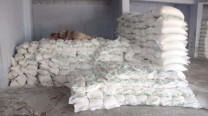Pakistan receives remittances amounting to $9.7b in Jul-Dec
Year-on-year increase stands at 6.2%, according to SBP data

Year-on-year increase stands at 6.2%, according to SBP data. PHOTO: EESHA AZAM
Remittances amounted to $9.1 billion in the same six months of the preceding fiscal year. They amounted to almost $1.63 billion in December alone, which is 2.8% higher than the remittances received in the preceding month, SBP data shows.
5MFY16: Pakistan pockets $8b in remittances
Pakistanis based in foreign countries sent home $18.4 billion in 2014-15, which translated into a YoY increase of 16.5%. Inflows from Saudi Arabia were the largest source of remittances in Jul-Dec. They amounted to nearly $2.9 billion in the six months, up 9.3% from the corresponding period of the last year.
Remittances received in Jul-Dec from the United Arab Emirates (UAE) increased 9.4% to $2.1 billion on a YoY basis. Inflows from the UAE had registered the largest increase (26.1%) from any major remittance-sending country in 2014-15, SBP data shows.
In the first six months of the current fiscal year, remittances from Dubai have surged 42% YoY. But the figure for overall inflows from the UAE so far has remained subdued because of a 27.2% annual decline in remittances from Abu Dhabi over the same period.
Remittances from the United States and the United Kingdom remained $1.3 billion and $1.2 billion, respectively, in Jul-Dec. The YoY change in remittances from the US and the UK has been -4.4% and 3.2%, respectively.
Remittances increase 0.8% year-on-year
Decline in US
According to a separate SBP report issued last month, it believes that US workers of Pakistani origin are holding on to their savings within the United States instead of remitting them back home. They are withholding that portion of their savings that they would otherwise send their families for “investment purposes,” the SBP believes.

In the presence of a wide gap between the rates of investment returns in the United States and Pakistan, US workers of Pakistani origin would prefer investing their savings in Pakistan until recently - something that resulted in healthy annual growth in worker remittances from the United States for many years.
But with interest rates going up in the United States and coming down in Pakistan, the difference in the average investment returns is narrowing.
Incoming: Remittances increase 16% over previous year
Remittances from Gulf Cooperation Council (GCC) countries, excluding Saudi Arabia and the UAE, clocked up at $1.1 billion in Jul-Dec, which is 11.7% higher than the remittances received from these countries in the same months of the preceding fiscal year.
Remittances from Kuwait in Jul-Dec equalled $365.6 million while those from Oman, Bahrain and Qatar amounted to $391.4 million, $236.5 million and $180.2 million, respectively.
This means the overall share of the oil-rich GCC countries in Pakistan’s remittances is over 64%. Many analysts fear remittances from these countries may dwindle going forward, as their governments begin to scale back infrastructure spending in the wake of a sharp fall in global oil prices.
Remittances received from Norway, Switzerland, Australia, Canada, Japan and ‘other countries’ last month amounted to $136 million as opposed to $102.9 million received in December 2014.
Published in The Express Tribune, January 12th, 2016.
Like Business on Facebook, follow @TribuneBiz on Twitter to stay informed and join in the conversation.



















COMMENTS
Comments are moderated and generally will be posted if they are on-topic and not abusive.
For more information, please see our Comments FAQ